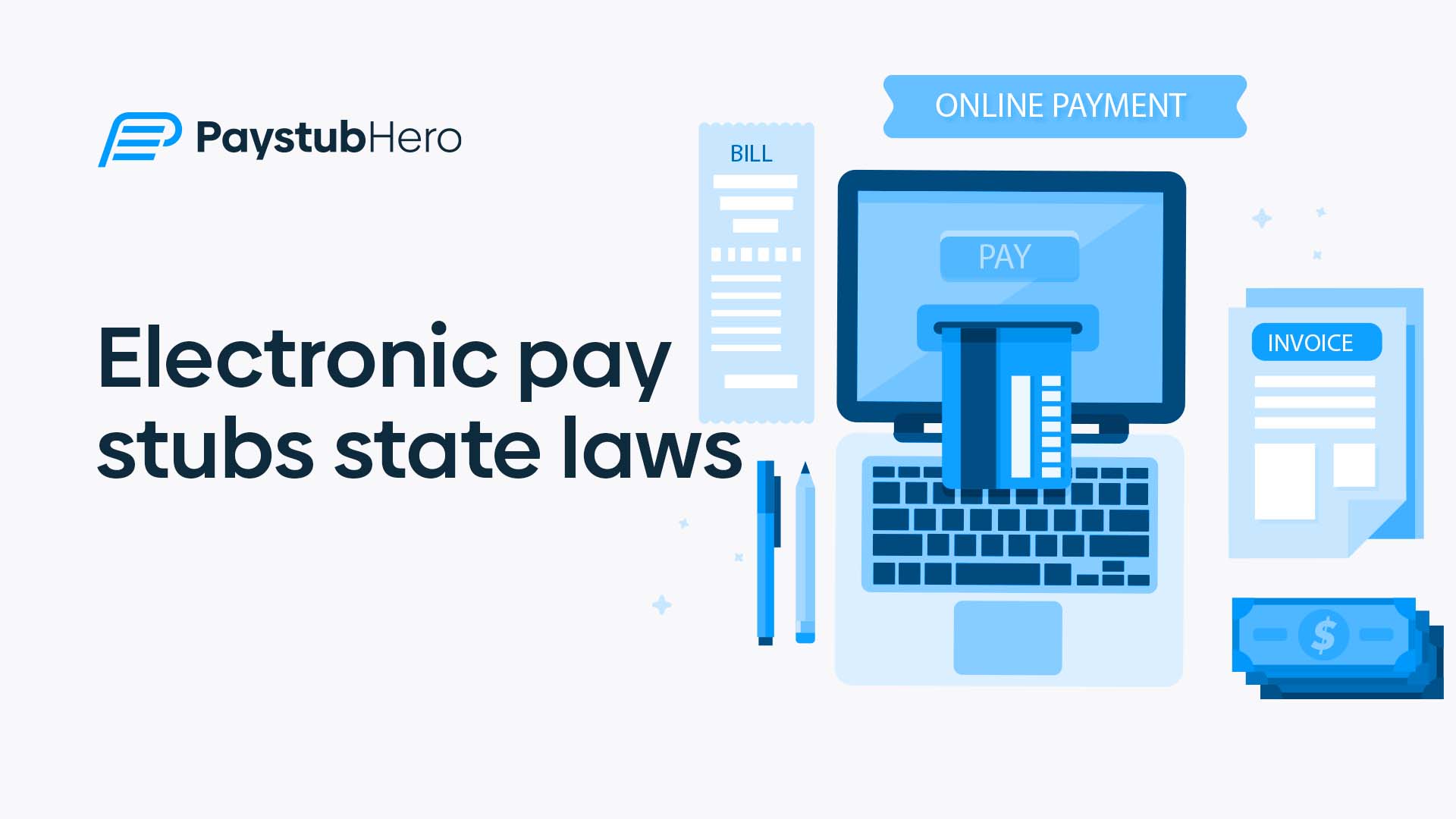In the era of rapidly evolving technology and constant digital transformation, businesses are always on the lookout for new ways to streamline their processes, enhance efficiency, and reduce their carbon footprint. One of these innovative steps forward is the transition from traditional paper pay stubs to electronic ones.
However, just like with any shift in business practices, this transition is intertwined with legal considerations that cannot be overlooked.
But what does this entail exactly?
In essence, electronic pay stubs state laws are the regulations that determine whether employers can issue electronic payslips, or digital versions of a traditional paper pay stub, as proof of income to their employees. These laws vary from state to state, making it crucial for employers, irrespective of their size or sector, to stay informed and ensure compliance.
The concept might seem simple at first glance, but it’s much more complex when you delve into the legal specifics. There are certain states that mandate employers to provide access to electronic payslips, while still preserving the employee’s right to opt for paper stubs.
In contrast, other states permit businesses to go completely paperless, allowing electronic payslips to be the exclusive method of wage proof unless an employee specifically requests a paper version.
Understanding the nuances of these laws and how to navigate them is integral for all employers, be it a start-up, a small-to-mid-sized business, or an independent contractor. Not only does it protect the company from legal complications, but it also shows the employees that their rights are respected and upheld.
This guide will help demystify electronic pay stubs state laws and provide actionable steps to help you navigate this digital transformation seamlessly and in compliance with the law.
Stay tuned as we take a deep dive into electronic payslips, direct deposit laws, ‘show stub’ regulations across states, and the varied implications of these laws on the understanding of paystub meanings.
Table of Contents
- Introduction
- Understanding Electronic Payslips: Embracing the Digital Revolution in Payroll Management
- Direct Deposit Laws and Electronic Payslips: Navigating the Intersections
- “Show Stub” Laws Across the States: Decoding the Variations
- Deciphering Paystub Meaning in the Context of State Laws
- Navigating Electronic Pay Stubs State Laws with Paystubhero: Your Partner in Seamless Payroll Management
- Conclusion and Call to Action
Understanding Electronic Payslips: Embracing the Digital Revolution in Payroll Management
In this digital age, the adoption of electronic payslips, also known as paystubs, is becoming more and more prevalent. These digital versions of traditional paper pay stubs are essentially a leap towards efficiency, convenience, and environmental sustainability.
They represent a significant reduction in paper waste, contribute to streamlined record-keeping, and provide an easier way for employees to access and manage their pay information.
However, as with any significant change in business operations, there are legal factors that need to be considered. Employers must remain informed about the different electronic pay stubs state laws before transitioning to this new mode of payroll management. These laws dictate the terms and conditions under which an employer can issue electronic payslips as proof of income.
It’s also worth mentioning that electronic payslips have proven to be a win-win situation for both employers and employees. For employers, they reduce the cost of paper, printing, and distribution, while also reducing the administrative burden of managing physical pay stubs.
For employees, they provide easy, anytime-access to pay information and create a secure archive for future reference.
However, the switch to electronic payslips is not as simple as clicking a button. Businesses must consider a myriad of factors including their state’s laws regarding electronic payslips, the accessibility of these digital documents for all employees, and the security measures in place to protect this sensitive information.
The shift to electronic payslips signifies an important step forward in modernizing payroll management.
Nevertheless, understanding the legal implications and operational considerations of this move is essential for any business. Let’s dive deeper into these aspects, starting with how electronic pay stubs state laws intersect with direct deposit laws.
Direct Deposit Laws and Electronic Payslips: Navigating the Intersections
When it comes to payroll, direct deposit laws and electronic payslips often go hand in hand. They are two sides of the same coin, both aimed at streamlining the wage payment process and making it more efficient.
As more businesses switch to digital payments, it’s essential to understand how these two elements intertwine under the umbrella of electronic pay stubs state laws.
Direct deposit is a method of payment where an employer electronically transfers wages into an employee’s bank account, eliminating the need for physical checks. It’s a preferred method for many due to its convenience, speed, and safety.
But this doesn’t mean that the need for a paystub, or pay advice, is eradicated. On the contrary, employers are still obliged to provide a detailed breakdown of employees’ earnings, deductions, taxes, and net pay.
This is where electronic payslips come into play. They serve as a digital form of this critical document, providing all the required details of an employee’s compensation. However, the manner in which employers provide these pay advices can significantly depend on each state’s specific direct deposit laws.
Certain states, for instance, permit employers to use direct deposit for employee wages but also mandate that employers provide a detailed paystub, either in paper or electronic format. This document must be readily available to employees and present a clear and concise summary of all deductions, taxes, and the final net pay.
In other states, the laws may vary, allowing employers to solely provide electronic payslips, unless a paper one is specifically requested by the employee. Navigating these variations in direct deposit laws and understanding their implications on the issuance of electronic payslips is key to ensuring legal compliance.
As we dive further into the labyrinth of electronic pay stubs state laws, we’ll next explore the intriguing variation of ‘show stub’ laws across different states.
“Show Stub” Laws Across the States: Decoding the Variations
The journey through the world of electronic pay stubs state laws gets even more intricate as we venture into the territory of ‘show stub’ laws. These laws are the regulatory frameworks that govern the manner and format in which employers must present paystubs to their employees. Just like the other aspects of wage laws, ‘show stub’ laws also exhibit significant variations from one state to another.
In some states, ‘show stub’ laws stipulate that employers must provide employees with access to their electronic payslips, while still preserving the employees’ right to request a paper stub. This means that even though an employer may primarily issue electronic paystubs, they must have a system in place to provide a traditional paper stub if an employee so desires.
On the other hand, certain states have adopted more progressive ‘show stub’ laws, permitting employers to issue electronic payslips exclusively. In these states, a paper paystub is only required if an employee specifically requests one. This enables companies to fully embrace the digital revolution and transition to a completely paperless payroll process.
However, irrespective of the method used, the focus of all ‘show stub’ laws remains the same: ensuring transparency in wage payments. Whether it’s a paper or electronic paystub, it’s crucial that employees have a clear, detailed, and accessible record of their earnings, taxes, and deductions.
Understanding these ‘show stub’ laws and adhering to them is crucial for businesses to maintain compliance, prevent legal issues, and uphold their employees’ rights. In the quest to decode these laws, the next piece of the puzzle is understanding the significance of the paystub itself and its meaning in the context of state laws.
Navigating Electronic Pay Stubs State Laws with Paystubhero: Your Partner in Seamless Payroll Management
With an understanding of the complexities surrounding electronic pay stubs state laws, it’s clear that navigating this terrain can seem a daunting task. The ever-changing legal landscape, the state-specific variations, and the critical importance of maintaining compliance make this an area that requires careful attention and expertise. That’s precisely where Paystubhero steps in, ready to guide you through the intricate maze of these laws.
Paystubhero is more than just an online payroll software. It’s a comprehensive solution designed specifically for entrepreneurs, freelancers, small businesses, and independent contractors. Recognizing the gaps in traditional payroll solutions, which often cater more to large corporations with hefty budgets, Paystubhero brings to the table a more affordable, user-friendly, and efficient alternative.
At the heart of Paystubhero lies a robust system that effortlessly handles payroll calculations, ensuring accuracy and consistency. This user-friendly software offers a seamless experience, where all you need to do is input your company and employee information, and let Paystubhero take care of the rest.
In addition to its user-friendly interface and precise calculations, Paystubhero also places a strong emphasis on staying updated with the various electronic pay stubs state laws. This ensures that your business stays compliant with legal requirements, whether you’re in a state that allows exclusive issuance of electronic payslips, or in one that requires the provision of paper stubs upon request.
This commitment to legal compliance, paired with an easy-to-use system, makes Paystubhero an ally for any business navigating the complex world of payroll management.
Whether you’re just starting out as an entrepreneur, running a small business, or working as an independent contractor, Paystubhero is there to simplify the process of generating paystubs, ensuring that you stay on the right side of electronic pay stubs state laws.
So, with a clear understanding of electronic pay stubs state laws, and a reliable partner like Paystubhero, are you ready to transform your payroll process? Join the ranks of businesses making the smart switch to digital, and take your first step towards hassle-free payroll management today!
Frequent Asked Questions
Is it legal to make pay stubs online?
Yes, it’s completely legal to create pay stubs online as long as the information provided is accurate and complies with state and federal laws.
Are employers required to provide a paystub?
Yes, employers are generally required to provide paystubs. However, the format (paper or electronic) and frequency can vary based on state laws.
Are you allowed to email pay stubs?
Yes, employers can email pay stubs, provided they ensure proper security measures to protect sensitive employee information.
Can an employer not give access to pay stubs?
No, employers are typically required by law to provide access to pay stubs, either electronically or in a paper format, based on specific state laws.








